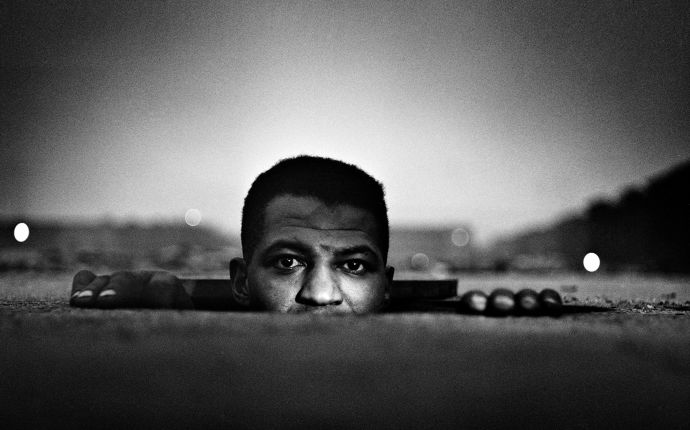
Gordon Parks, Emerging Man, Harlem, New York, 1952, black-and-white photograph. Photo via The New Yorker
- Our editor Lorin Stein talks to Frederick Seidel about his poems, his persona, and the kind of seedy back-alley porn shops you just can’t find in London anymore: “I think it’s too bad, but unsurprising, that this myth of the beautifully outfitted, elegant, elegantly sinister, Baudelaire sort of fellow striding and sliding down the streets of New York has become a way of not talking about the poems. Some reviewers over the years have liked that figure, liked summoning him up. He doesn’t exist, and isn’t really in the poems. Baudelaire is a hero of mine. Baudelaire and how he did it is of great interest. But this persona does get in the way, I think … Personally, I enjoy someone saying to me: I very much enjoyed that poem, I was moved by that poem, that poem really surprised me. I like the simplicity of statements of that sort. I understand they do not a review make, however large their meaning may be, or however much they may contain.”
- Because even hell must have a sound track, there is music playing at Penn Station, and someone is responsible for managing the playlist. Bizarrely enough, that unenviable task falls to three women in a windowless office in Austin, Texas: “Amy Frishkey, one of the programmers, understands the otherness of picking the music that people hear between the train-boarding announcements … The puny-sounding speakers at Penn Station play a stream of classical pieces along with ‘easy instrumentals’ that sound like dentist-office arrangements, mostly contemporary piano and guitar solos—and, one afternoon last month as the evening rush was approaching, a Sinatra hit that seemed to have been arranged for French horn. The result is a Beethoven quartet one minute, something vaguely New Age the next … ‘It’s almost as if you’re trying to D.J. the world’s largest wedding reception,’ Danny Turner, Ms. Frishkey’s boss, said. But it is a reception without a bride or groom, and the 650,000 people who pass through Penn Station every day do not dance to the music.”
- In 1947, a small magazine asked Ralph Ellison if he’d want to do a photo essay on Harlem’s Lafargue Psychiatric Clinic, which had made a name for itself by standing against segregation. Ellison and the photographer Gordon Parks took the assignment, but the magazine soon folded—and so their work is only now coming to light. Vinson Cunningham writes: “In a conceptual note, outlining what he called the project’s ‘pictorial problem,’ Ellison wrote that Parks’s prints ‘must present scenes that are at once both document and symbol; both reality and (for the reader) psychologically disturbing “image.” ’ Parks’s ingenious solution to this ‘problem’—which, essentially, is a re-articulation of what we mean by photographic art—can be seen in an image of a shadow-shrouded man walking in an alley. Before him sit huge, indiscriminate mounds of rubble. Lines of white laundry hang far above his head, between tenement fire escapes. Light travels from the upper corner of the composition, softly through the drying clothes, then slantingly toward the camera’s eye, making the man little more than a silhouette while—somewhat paradoxically—throwing every detail of a nearby wall into sharp, sculpted relief.”
- Today is Prince’s birthday—the Minnesota governor has declared it Prince Day, and I’m wearing my Purple RainT-shirt. “The Morning Papers,” a collection at Media Diversified, invites writers of color and Prince devotees to reflect on his legacy. Tanuja Desai Hidier, who was many moons ago an intern at the Review, remembers him in the poem “Zindagi bhar nahin bhoolegi woh Purple barsaat ki raat”: “Pulsing purple Om. / Love symbol. Id. / Strumming us home: / A compass. The Kid.” And in “Camille Ain’t Dead, Honey,” Gemma Weekes mulls on his death: “We remembered all his talk about the Spooky Electric. Some of us thought The Kid was irresponsible and that the Spooky Electric was a train he’d jumped on in the middle of the night, taking him off to some traitorous adventure elsewhere. He’d not read section 3, passage 33 of the Town Rules that stipulated he choose a successor before quitting city limits … A growing percentage theorized that The Spooky Electric was a It wanted his light. It wanted to stop his light from spreading, so The Kid was kidnapped, or scrubbed free of glitter and buried under a thousand layers of darkness.”
- In which Diana Hamilton embarks on a journey to define “fictional poetry”: “I realized I had never been writing about ‘postconceptual poetry’ at all, but about something I started to call ‘Fictional Poetry’—i.e., poetry that uses the style, plot, characterization, or forms of fiction … Key to this sense of the ‘fictional’ is a quality of aboutnessthat prevents overemphasis on form—and on the repetition of the forms that often characterizes the appearance of schools—and especially resists the belief that the shape a poem takes, rather than its ‘topic,’ is always the source of its politics / interestingness / literariness / purpose. Instead, the books I want to write about don’t mind being about things … A lot of contemporary poetry does not deal very directly with its ‘content’; or rather, it seems contentless. Most things that pass for poems today are list poems without knowing it: by trying to focus on the lyrical image’s mediation of reference, they become mere collections of images that pride themselves on their irrelevance.”

 Media for the Apocalypse
Media for the Apocalypse  The RNC sued Google over Gmail spam filtering
The RNC sued Google over Gmail spam filtering  Wordle today: Here's the answer, hints for October 21
Wordle today: Here's the answer, hints for October 21  Bumble makes cyberflashing detection tool available as open
Bumble makes cyberflashing detection tool available as open  Best headphones deal: Save $120 on Sony WH
Best headphones deal: Save $120 on Sony WH 










